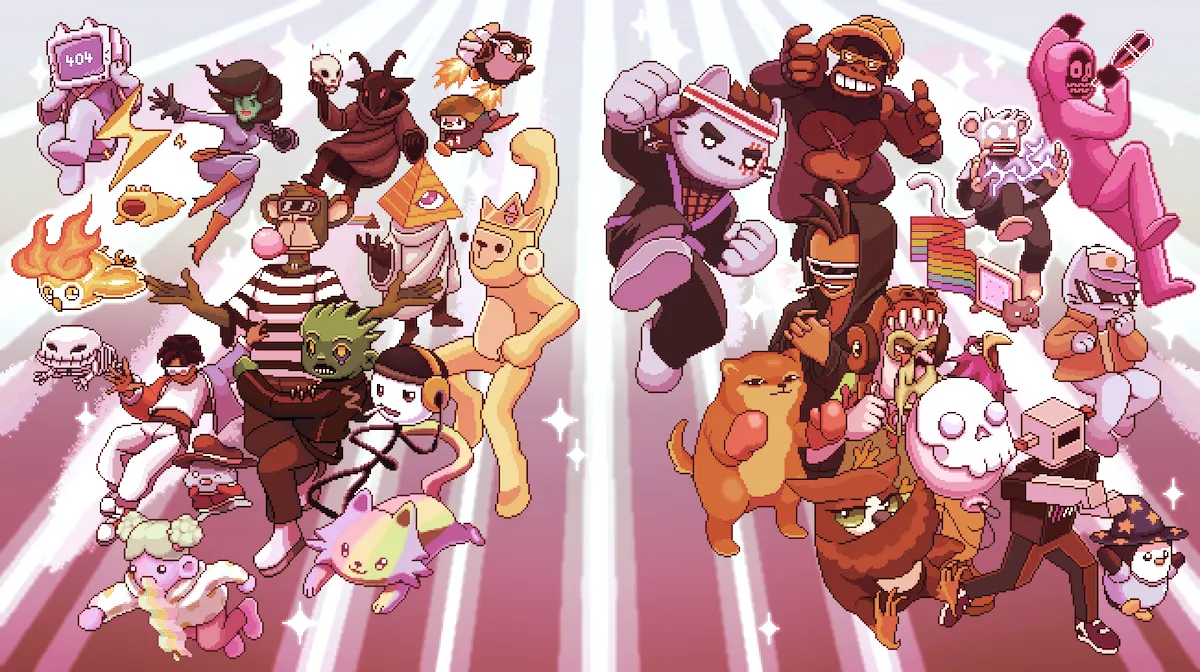Most metaverse games opt for 3D environments, with varying degrees of success, but Worldwide Webb has charted a different path: this massively multiplayer online (MMO) world opts for a retro, Super Nintendo-esque style, yet it supports more than a million Ethereum NFT avatars.
And it’s expanding, thanks in part to a new funding round.
Worldwide Webb, founded by artist and game designer Thomas Webb, today revealed a $10 million Series A round funded entirely by VC firm Pantera Capital. It’s the game’s first external funding round since its initial debut in 2020.
Despite looking like an early 1990s throwback, Worldwide Webb is a fully online, browser-based experience that lets players plug in an Ethereum wallet and use their NFT avatars from hundreds of popular collections, including the Bored Ape Yacht Club, CryptoPunks, Doodles, Cool Cats, Deadfellaz, and plenty more.
Popped onto @Worldwide_WEB3 to claim my valentines items, getting web3 @RuneScape vibes, with a lot more style.@WebbEmotional and co. have done an amazing job continuing to build in the bear! pic.twitter.com/pQoolM59yT
— Pranksy 📦 (@pranksy) February 16, 2023
Each supported avatar is converted into a 2D pixel character that players can then guide through the world, interacting with other players, exploring the environments, and even soaking in the story.
Worldwide Webb also has its own NFT land plots in the form of digital apartments that users can customize, and those NFTs have yielded more than $80 million to date worth of trading volume.
Webb, the founder and CEO, told Decrypt that the funding will help expand his development team, with ambitions to double headcount from its current tally of 30 people.
“We've been moving fast and we've been shipping product,” Webb said. “But for us, it's a case of wanting to move faster. We want to build faster, and we want to innovate faster.”
What's next for World Wide Webb?
The next big step forward is Blockbusterz, a player-vs.-player (PvP) competitive mode that lets teams of five battle it out.
Thanks to NFT interoperability, players will be able to bring their Apes, Cats, Punks, and plenty more into the mode, which Webb demoed for Decrypt.
It looks like a streamlined multiplayer online battle arena (MOBA) game, akin to mobile hit Brawl Stars, as players attack each other and attempt to control the battlefield.
The cinematic 3D trailer embedded above gives a sense of the vibe of the cross-project experience, with a brief taste of the actual 2D gameplay shown at the end.
“Because we have over 200 collections integrated, I wanted to see the Deadfellaz versus the Doodles,” Webb said. “I wanted to see CryptoPunks versus the Bored Ape Yacht Club in competitive battles—and then for us to be able to issue rewards.”
The PvP mode will introduce a “compete-to-mint” mechanic that lets players earn NFTs simply by playing and excelling in the competitive mode. Webb said that the game mechanics are purposefully designed to be difficult to cheat via an automated bot or script—a hurdle that Bored Ape creator Yuga Labs faced with its recent Dookey Dash game competition.
Longer-term, Webb aims to take even more inspiration from time-absorbing gaming classics like RuneScape and Ultima Online, keeping players hooked with richer gameplay and narrative. He said the funding will help attract more veteran talent so that they can grow Worldwide Webb into a “massive, sprawling universe.”
Eventually, Webb said he’s keen on creating native iOS and Android apps should Apple and Google grow friendlier to Web3 business models, and similarly aims to bring the game to console platforms if giants like Nintendo and PlayStation eventually play nice with NFTs.
And while eye-catching 3D trailers are purely cinematic teasers—not indicative of a visual transformation for the game—his team is exploring potential ways to bring 3D elements into the experience without shedding the retro allure.
He pointed to Square Enix’s role-playing game Octopath Traveler as an example of an effective hybrid aesthetic.
The 2D look is a differentiator, and even with one less dimension on-screen, Webb doesn’t see it as a limitation. He still wants to deliver a large-scale, cross-project metaverse mash-up like “Ready Player One,” albeit with pixel graphics. Fortnite currently serves up that kind of cross-IP affair, but within a limiting, closed-garden ecosystem.
“What I was really hoping to do was to see a metaverse game that people can go into, but they can bring these things in,” he said, “in a permissionless manner.”

